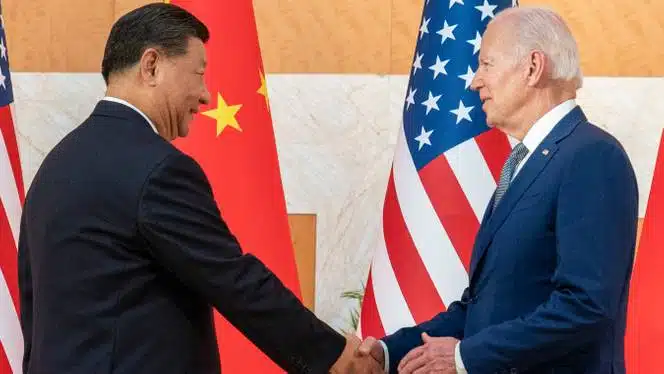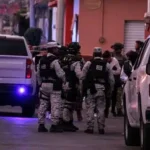“If the United States insists on suppressing China’s high-tech development and depriving China of its legitimate right to development, we will not sit idly by,” Xi told Vice President Biden while on the phone.
State media said that Chinese President Xi Jinping informed US counterpart Joe Biden that Beijing “will not sit idly by” if the US persisted in stifling “China’s high-tech development”.
In a phone conversation on Tuesday, President Joe Biden and Xi Jinping sparred about US trade restrictions on technology and Taiwan, but they attempted to diffuse the situation as two senior US officials were scheduled to visit Beijing soon.
The two leaders’ phone chat represented their first face-to-face communication since a November summit in California that witnessed a noticeable thawing of the long-standing rivalry between the two biggest economies in the world, if not of their tone.
Treasury Secretary Janet Yellen is scheduled to depart on Wednesday and will stop in Guangzhou, a city in the south that represents China’s manufacturing prowess, as well as Beijing. Secretary of State Antony Blinken is expected in China in the upcoming weeks, according to officials.
“To control emotions, correct misconceptions, and avert unintentional conflict, intense rivalry necessitates intense diplomacy. And making this call is one method to accomplish that,” a US official told reporters during a briefing.
According to the official, the two leaders were forthright about their strong opinions and the talks were not intended to settle conflicts.
Problem with high-tech exports
Xi charged that Biden’s broad prohibition on high-tech exports was an attempt by the US to put the economy at risk.
Chinese state media quoted Xi as saying, “We will not sit idly by if the United States insists on suppressing China’s high-tech development and depriving China of its legitimate right to development.”
As the White House stated, Biden informed him that “the United States will continue to take necessary actions to prevent advanced US technologies from being used to undermine our national security, without unduly limiting trade and investment.” Biden turned down the plea.
China’s most powerful leader in decades, Xi, has consolidated authority at home and adopted a harsh stance in Asia, stepping up clashes with the Philippines in the South China Sea in recent weeks and clamping down on freedoms in Hong Kong.
However, US analysts perceive Xi as willing to defuse tensions with the US as China navigates its challenging economic conditions.
He acquiesced to two major demands made by the US during the California summit: restrictions on the precursor chemicals to fentanyl, the synthetic opioid that is causing an overdose epidemic in the US, and the restoration of communication between the two armed forces about crisis management.
However, US analysts perceive Xi as willing to defuse tensions with the US as China navigates its challenging economic conditions.
He acquiesced to two major demands made by the US during the California summit: restrictions on the precursor chemicals to fentanyl, the synthetic opioid that is causing an overdose epidemic in the US, and the restoration of communication between the two armed forces about crisis management.
A warning about Taiwan
The White House stated that before to President-elect Lai Ching-te’s inauguration on May 20, Biden put pressure on Xi to guarantee “peace and stability” across the Taiwan Strait.
China has criticized Lai, a longtime ally of the self-ruling democracy Beijing claims, but US officials have been cautiously optimistic that China won’t go beyond custom in its military maneuvers ahead of the inauguration.
According to official media, Xi informed Biden over the phone that Taiwan is still a “uncrossable red line” for China.
Concern over China’s increasing actions against the Philippines in the highly contentious South China Sea has grown in the United States.
The Biden administration has prioritized assisting allies over preserving diplomatic relations with China.
Next week, Japanese Prime Minister Fumio Kishida will make a state visit to Washington amid the diplomatic frenzy with China. Filipino President Ferdinand Marcos will also be attending the three-way discussions.
Last month, Blinken also traveled to the Philippines and reiterated US pledges to protect the alliance.
Both Blinken and Yellen will be visiting China for the second time in less than a year, signaling a return to more regular exchanges between the two superpowers.
Since the Covid epidemic and rising tensions under Trump, Blinken’s travel to the United States last year was the highest-ranking one taken by an American in five years.
In contrast to his approach to Russian President Vladimir Putin, whom he has avoided since Moscow’s war on Ukraine, Biden has engaged in significant diplomacy.
As China’s efforts to assist Russia in rebuilding its military-industrial base increase, Biden expressed alarm about the potential risks to European security, according to the White House.
SOURCE: TRTWORLD






